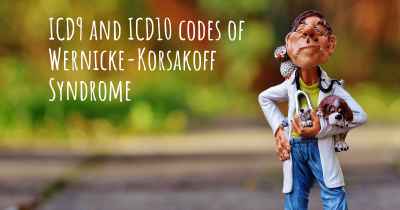Is Wernicke-Korsakoff Syndrome hereditary?
Here you can see if Wernicke-Korsakoff Syndrome can be hereditary. Do you have any genetic components? Does any member of your family have Wernicke-Korsakoff Syndrome or may be more predisposed to developing the condition?

Wernicke-Korsakoff Syndrome is not directly hereditary. However, certain genetic factors can increase the susceptibility to developing the condition. The syndrome is primarily caused by a deficiency of thiamine (vitamin B1), often due to chronic alcohol abuse. It is important to note that while the condition itself is not hereditary, the genetic predisposition to alcoholism can be passed down through families, increasing the risk of developing Wernicke-Korsakoff Syndrome.
Is Wernicke-Korsakoff Syndrome hereditary?
Wernicke-Korsakoff Syndrome (WKS) is a neurological disorder that results from a deficiency in thiamine (vitamin B1). It is primarily associated with chronic alcoholism, although it can also occur due to other conditions that lead to thiamine deficiency, such as malnutrition, gastrointestinal disorders, and certain types of cancer.
When it comes to the hereditary nature of Wernicke-Korsakoff Syndrome, the answer is no. WKS is not directly inherited from parents to their children. It is not a genetic disorder that is passed down through generations.
However, it is important to note that there may be a genetic predisposition to alcoholism, which is a major risk factor for developing WKS. Studies have shown that certain genetic variations can influence an individual's susceptibility to alcohol dependence. These genetic factors can contribute to the development of alcoholism, which in turn increases the risk of developing WKS.
Wernicke-Korsakoff Syndrome is actually caused by a combination of factors, including alcohol abuse, poor nutrition, and impaired thiamine absorption. Alcohol interferes with the body's ability to absorb and utilize thiamine, leading to a deficiency over time. Thiamine is essential for the proper functioning of the brain, and its deficiency can result in damage to the brain structures associated with memory and learning.
Wernicke's encephalopathy is the acute phase of WKS and is characterized by symptoms such as confusion, ataxia (loss of muscle coordination), and ophthalmoplegia (paralysis of eye muscles). If left untreated, Wernicke's encephalopathy can progress to Korsakoff's syndrome, which is characterized by severe memory loss, confabulation (fabrication of false memories), and other cognitive impairments.
While WKS itself is not hereditary, it is important to consider the potential impact of family history on an individual's risk for alcoholism and subsequent development of WKS. Growing up in an environment where alcohol abuse is prevalent can increase the likelihood of developing alcohol dependence. Additionally, certain genetic factors can influence an individual's response to alcohol and their susceptibility to addiction.
Prevention and treatment of Wernicke-Korsakoff Syndrome primarily involve addressing the underlying causes, such as alcohol abuse and thiamine deficiency. For individuals with alcohol dependence, seeking treatment and support for alcohol addiction is crucial. Alcohol withdrawal should be done under medical supervision to minimize the risk of complications.
Thiamine supplementation is a key component of treatment for WKS. In severe cases, thiamine may need to be administered intravenously to ensure adequate absorption. A balanced diet that includes foods rich in thiamine, such as whole grains, legumes, nuts, and lean meats, can also help prevent thiamine deficiency.
In conclusion, Wernicke-Korsakoff Syndrome is not a hereditary disorder. It is primarily caused by chronic alcohol abuse and thiamine deficiency. While there may be a genetic predisposition to alcoholism, WKS itself is not directly inherited. Understanding the risk factors and taking steps to address alcohol dependence and ensure proper nutrition can help prevent the development of WKS.








